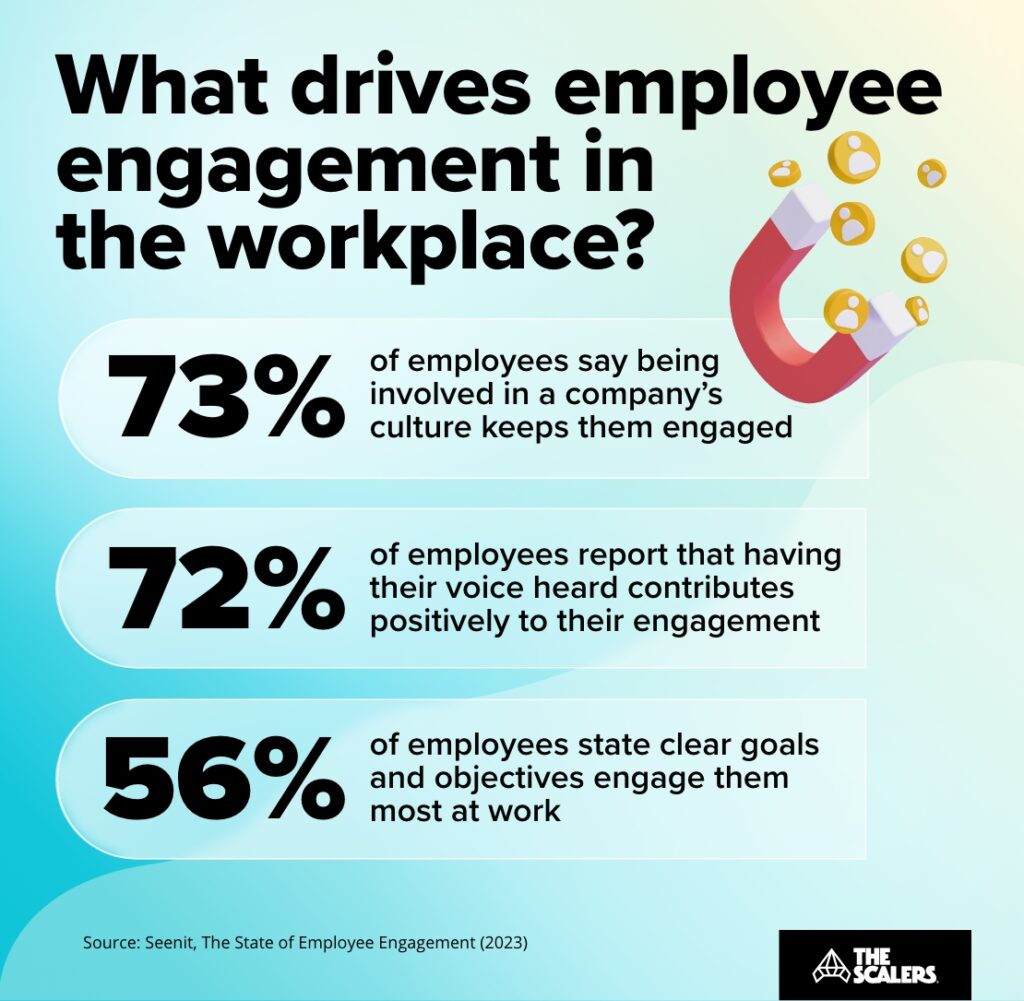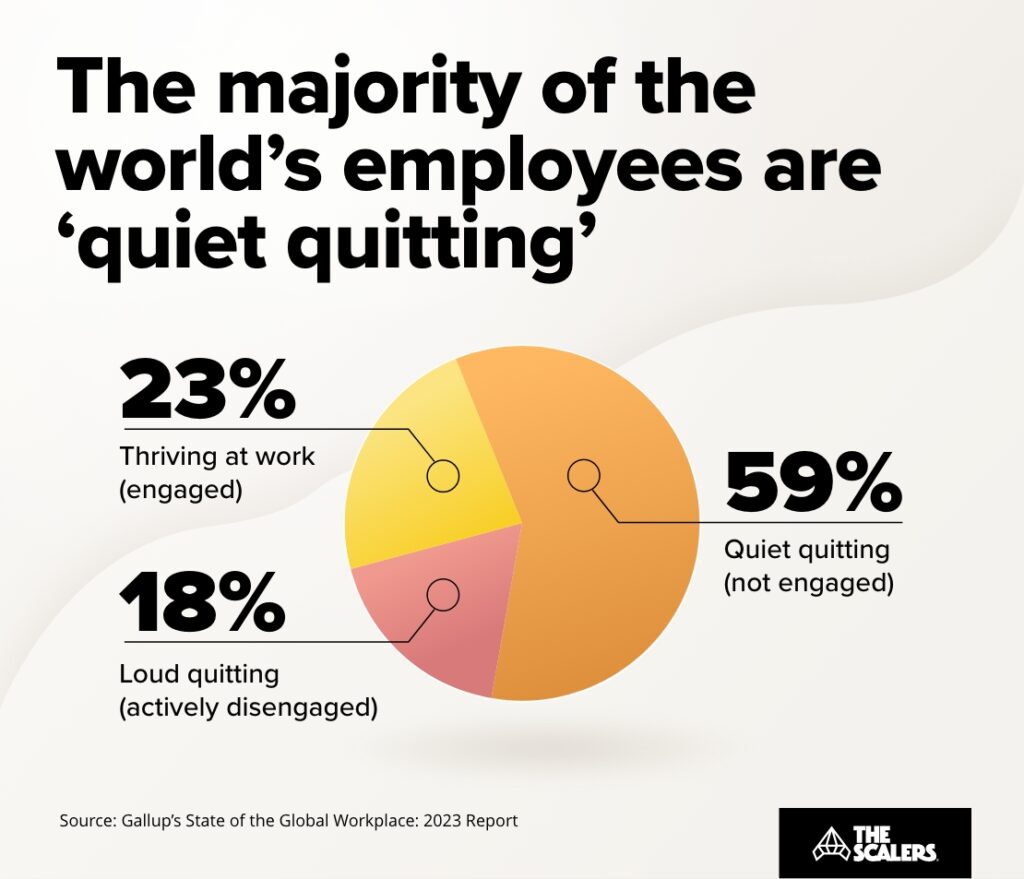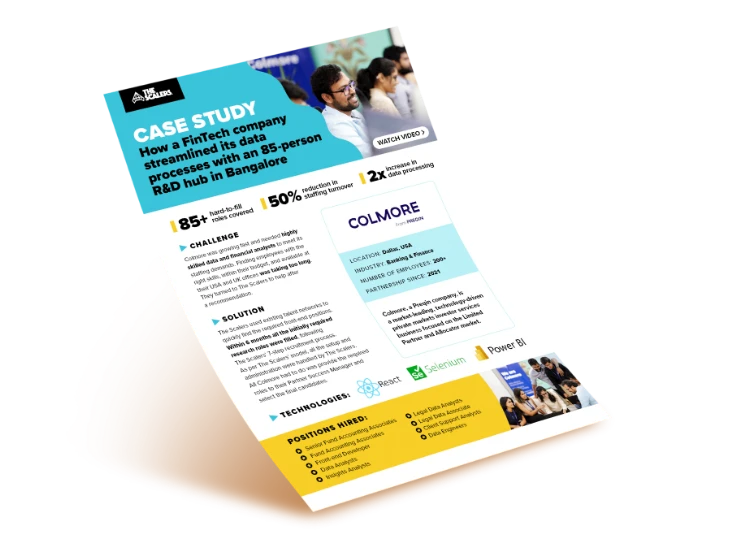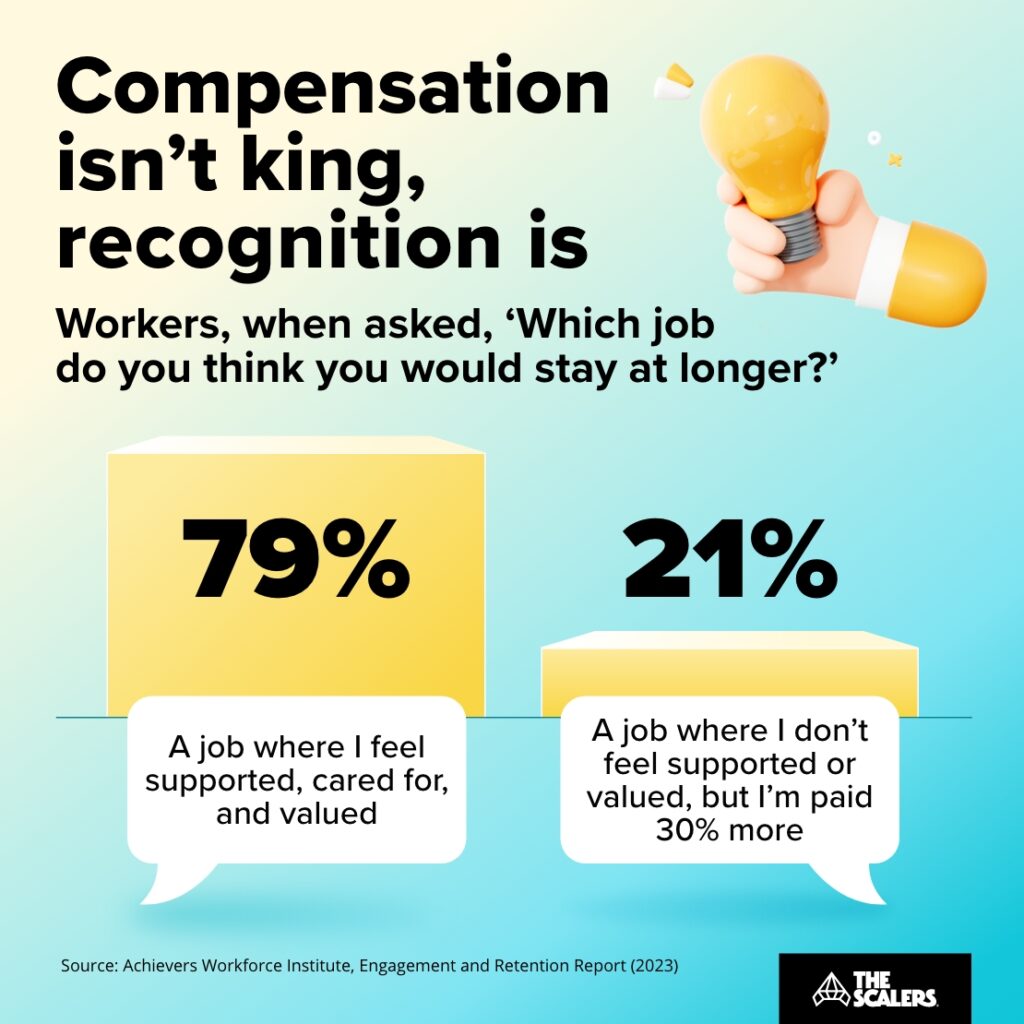Employees today are looking for more than just a 9-to-5 job. They want to be motivated, appreciated, and enthusiastic about the organisation they work for.
In other words, they want to be engaged.
According to a 2023 report by communications firm Edelman, 80% of people desire personal empowerment at work, and 71% prioritise making a societal impact. This implies working for a greater purpose in an organisation where they have a voice and feel heard.
At The Scalers, we know first-hand the importance and impact of employee engagement. We’ve built over 80 teams of dedicated engineers for our partners in the past 10+ years — and have earned the Great Place to Work certification for two consecutive years.
While doing so, we’ve prioritised employee wellbeing, ensuring every team member is comfortable and satisfied with their tasks.
In this article, we’ve considered our experience to discuss the tangible impact of employee engagement and its benefits.
Let’s get started!
What is employee engagement?
Undoubtedly, employee engagement is a hot topic in the business world. But what does it really mean?
According to the online encyclopedia Wikipedia, an engaged employee is “fully absorbed by and enthusiastic about their work and so takes positive action to further the organisation’s reputation and interests.”
Today, employee engagement has also become synonymous with phrases like employee experience and satisfaction, which refer to an employee’s journey with an organisation.

What’s the impact of employee engagement?
The effects of employee engagement in an organisation can lead to:
- Higher employee retention.
- Enhanced productivity.
- Better customer experience.
- Increased innovation.
- Greater profitability.
Let’s have a closer look at each benefit.
Higher employee retention
Engaged employees are less likely to leave their jobs.
Similarly, employees not attached to their work will more likely leave to pursue a career that offers higher remuneration, extra employee-centric benefits, or flexible work conditions.
And there’s research to back this up.
According to a study, 70% of employees would leave their current job for one that pays better, even if they weren’t looking to switch companies.
By implementing the right employee engagement strategies, you’ll attract quality talent for your company and better retain your existing employees. This, in turn, will reduce turnover and eliminate hiring costs (nearly $4,700 on average).

Discover how to scale development teams in 2023 and beyond
DOWNLOAD EBOOKYou’ll also be fighting against quite quitting, a trend that has become popular in recent years. Quiet quitting refers to people making the minimum necessary effort in their roles, not adding extra value and showing no passion for their work.

Enhanced productivity
The highest performers in an organisation are, generally:
- in roles where their job profile aligns with their innate talents.
- a part of the business for a decade or more.
- engaged in their work.
When employees are engaged, they care about the organisation they work for and are more likely to invest additional time and effort in their work. This, in turn, leads to higher productivity, allowing them to produce more quality work.
This fact holds true across roles, businesses, and industries. For instance, studies prove that 85% of engaged healthcare workers displayed a genuinely caring attitude toward patients, compared to only 38% of disengaged employees.
Which brings us to our next point…
Better customer experience
The impact of employee engagement isn’t just felt within your organisation — it also influences how your employees treat your customers.
Engaged employees are happier at work and, thus, tend to provide a better customer experience. And when your customers are satisfied with your products and services, your business will automatically be more successful.
See Starbucks.
The vast majority of customers’ affinity towards the popular multinational chain of coffeehouses is driven by how the company treats its employees. Starbucks baristas are not referred to as ’employees’ but ‘partners’.
All partners are offered a range of employee-centric benefits, such as health insurance and stock options, irrespective of their designation, which isn’t a common occurrence. This results in happier employees, which means happier customers.
In fact, as of 2024, Starbucks ranks 16th in Fortune magazine’s list of ‘World’s Most Admired Companies’. The organisation also has some of the lowest employee turnover rates in the food and beverage industry.

How we helped a FinTech scale its data insights team to an 85-person R&D hub in Bangalore
DOWNLOAD CASE STUDYIncreased innovation
One of the main reasons to improve employee engagement in your organisation is to promote innovation.
When employees are (really) engaged, they’re more likely to notice what needs fixing at work. They understand and share the company’s mission and values and feel like their ideas matter, so they’re not shy about bringing up solutions to help the company innovate.
Offering fresh perspectives or different points of view might feel intimidating. However, employees who work in companies that invest in employee engagement feel encouraged to share out-of-the-box ideas.

Greater profitability
Employee engagement impacts business results — more than what you’d expect.
Gallup, one of the world’s most recognised analytics and advisory companies, found that companies with engaged employees are 23% more profitable.
The long-term financial success of a business depends on some of the factors we’ve listed earlier in the article:
- Engaged employees are more committed to their craft, boosting productivity and impacting the bottom line directly.
- Their innovative ideas and problem-solving abilities drive cost savings and revenue generation.
- They deliver exceptional customer service, which leads to higher customer retention rates and increased sales, enhancing profitability in the long run.
Simply put, employee engagement is one of the keys to securing the financial health of your business.

Final thoughts on the benefits of employee engagement
It’s no surprise that organisations are investing more time and resources to create engagement initiatives than ever before.
After all, employees are demanding them.
Besides concerns such as poor company communication, lack of acknowledgement, and inadequate compensation, workers are frustrated that companies don’t prioritise their engagement as a strategic business objective.
While regular potlucks and ‘Fun Fridays’ are great, they fail to address many of the deeper challenges that underpin employee satisfaction.
You can’t fix a leaky faucet if you don’t know where the source of the leak is. Similarly, you can’t drive impactful employee engagement if you don’t understand why your employees are disengaged in the first place.
You must first understand the key components of employee engagement, including leadership and professional growth.

If you’re interested in building a fully integrated and engaged global development team, we’re here to help. At The Scalers, we specialise in assembling high-performing engineering teams prioritising employee wellbeing and satisfaction.
Feel free to reach out to us by filling out this form. One of our senior executives will contact you shortly.
















